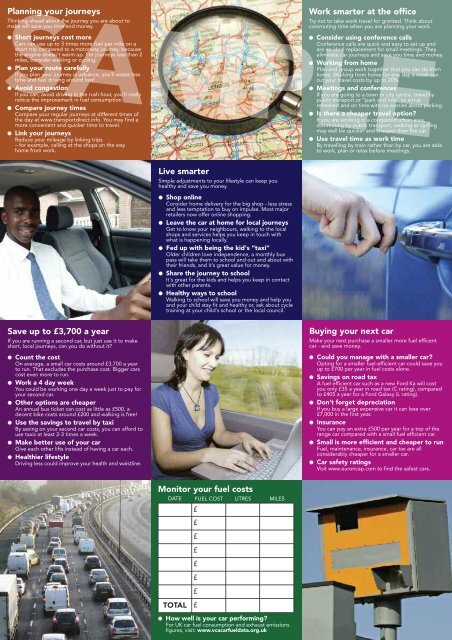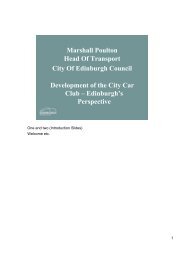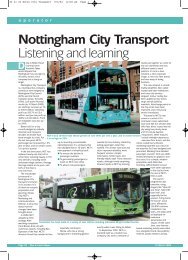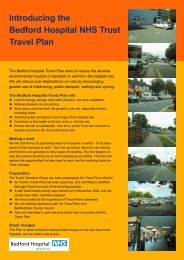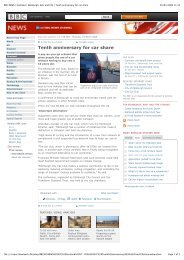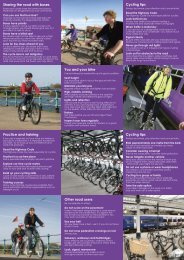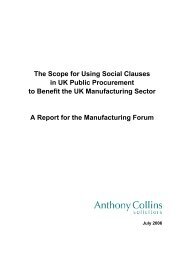Car Costs leaflet Sample.pdf - Richard Armitage Transport ...
Car Costs leaflet Sample.pdf - Richard Armitage Transport ...
Car Costs leaflet Sample.pdf - Richard Armitage Transport ...
You also want an ePaper? Increase the reach of your titles
YUMPU automatically turns print PDFs into web optimized ePapers that Google loves.
Planning your journeys<br />
Thinking ahead about the journey you are about to<br />
make will save you time and money.<br />
● Short journeys cost more<br />
<strong>Car</strong>s can use up to 3 times more fuel per mile on a<br />
short trip compared to a motorway journey, because<br />
the engine doesn’t warm up. For journeys less than 2<br />
miles, consider walking or cycling.<br />
● Plan your route carefully<br />
If you plan your journey in advance, you’ll waste less<br />
time and fuel driving around lost!<br />
● Avoid congestion<br />
If you can, avoid driving in the rush hour, you'll really<br />
notice the improvement in fuel consumption.<br />
● Compare journey times<br />
Compare your regular journeys at different times of<br />
the day at www.transportdirect.info. You may find a<br />
more convenient and quicker time to travel.<br />
● Link your journeys<br />
Reduce your mileage by linking trips<br />
– for example, calling at the shops on the way<br />
home from work.<br />
Work smarter at the office<br />
Try not to take work travel for granted. Think about<br />
commuting time when you are planning your work.<br />
● Consider using conference calls<br />
Conference calls are quick and easy to set up and<br />
are an ideal replacement for small meetings. They<br />
eliminate car journeys and save you time and money.<br />
● Working from home<br />
Plan and group work together that you can do from<br />
home. Working from home for one day a week can<br />
cut your travel costs by up to 20%.<br />
● Meetings and conferences<br />
If you are going to a town or city centre, travel by<br />
public transport or “park and ride” to arrive<br />
refreshed and on time with no worries about parking.<br />
● Is there a cheaper travel option?<br />
If you are working in a congested urban area,<br />
commuting by public transport, walking or cycling<br />
may well be quicker and cheaper than the car.<br />
● Use travel time as work time<br />
By travelling by train rather than by car, you are able<br />
to work, plan or relax before meetings.<br />
Live smarter<br />
Simple adjustments to your lifestyle can keep you<br />
healthy and save you money.<br />
● Shop online<br />
Consider home delivery for the big shop - less stress<br />
and less temptation to buy on impulse. Most major<br />
retailers now offer online shopping.<br />
● Leave the car at home for local journeys<br />
Get to know your neighbours, walking to the local<br />
shops and services helps you keep in touch with<br />
what is happening locally.<br />
● Fed up with being the kid's “taxi"<br />
Older children love independence, a monthly bus<br />
pass will take them to school and out and about with<br />
their friends, and it’s great value for money.<br />
● Share the journey to school<br />
It's great for the kids and helps you keep in contact<br />
with other parents.<br />
● Healthy ways to school<br />
Walking to school will save you money and help you<br />
and your child stay fit and healthy or, ask about cycle<br />
training at your child's school or the local council.<br />
Save up to £3,700 a year<br />
If you are running a second car, but just use it to make<br />
short, local journeys, can you do without it?<br />
● Count the cost<br />
On average, a small car costs around £3,700 a year<br />
to run. That excludes the purchase cost. Bigger cars<br />
cost even more to run.<br />
● Work a 4 day week<br />
You could be working one day a week just to pay for<br />
your second car.<br />
● Other options are cheaper<br />
An annual bus ticket can cost as little as £500, a<br />
decent bike costs around £200 and walking is free!<br />
● Use the savings to travel by taxi<br />
By saving on your second car costs, you can afford to<br />
use taxis at least 2-3 times a week.<br />
● Make better use of your car<br />
Give each other lifts instead of having a car each.<br />
● Healthier lifestyle<br />
Driving less could improve your health and waistline.<br />
Buying your next car<br />
Make your next purchase a smaller more fuel efficent<br />
car - and save money.<br />
● Could you manage with a smaller car?<br />
Opting for a smaller fuel-efficient car could save you<br />
up to £700 per year in fuel costs alone.<br />
● Savings on road tax<br />
A fuel efficient car such as a new Ford Ka will cost<br />
you only £35 a year in road tax (C rating), compared<br />
to £405 a year for a Ford Galaxy (L rating).<br />
● Don’t forget depreciation<br />
If you buy a large expensive car it can lose over<br />
£7,000 in the first year.<br />
● Insurance<br />
You can pay an extra £500 per year for a top of the<br />
range car compared with a small fuel efficient car.<br />
● Small is more efficient and cheaper to run<br />
Fuel, maintenance, insurance, car tax are all<br />
considerably cheaper for a smaller car.<br />
● <strong>Car</strong> safety ratings<br />
Visit www.euroncap.com to find the safest cars.<br />
Monitor your fuel costs<br />
DATE FUEL COST LITRES MILES<br />
£<br />
TOTAL<br />
£<br />
£<br />
£<br />
£<br />
£<br />
£<br />
£<br />
● How well is your car performing?<br />
For UK car fuel consumption and exhaust emissions<br />
figures, visit: www.vcacarfueldata.org.uk
Driving Style<br />
Smarter driving techniques will save you money and<br />
keep you safe.<br />
● Drive smoothly<br />
Aggressively accelerating or late braking wastes fuel<br />
(up to 20%), so try to drive consistently. Use your rev<br />
counter to keep your revs low and save fuel.<br />
● Read the road ahead<br />
Look out in advance for anything that might require<br />
you to slow down or stop and slow down gradually.<br />
● Use the gears correctly<br />
Change up into a higher gear as soon as it's possible<br />
and safe to do so. This can make savings of your fuel<br />
bill of up to 15%.<br />
● Reduce your speed<br />
Travelling at 80mph on the motorway will use<br />
between 10% and 20% more fuel than doing 70mph.<br />
● Drive more leisurely and save even more<br />
If you really want to save money, travelling at 50mph<br />
will use between 20% and 30% less fuel than doing<br />
70mph.<br />
Money saving tips<br />
Reducing unnecessary weight and idling will save you<br />
fuel and money.<br />
● Use the air conditioning less<br />
Air con increases fuel use by up to 10%. So, driving<br />
with the air con on is equivalent to paying up to<br />
10p per litre more for your fuel.<br />
● Don't rev the engine<br />
Revving the engine whilst stationary achieves<br />
nothing except wasting fuel and costing you money.<br />
● Don’t warm up the engine<br />
It causes unnecessary engine wear, as well as wasting<br />
fuel. Instead, invest in some decent de-icer and try<br />
to drive off straight away.<br />
● Lighten the load<br />
Don’t carry unnecessary stuff around in the boot<br />
- a 15% weight increase will see fuel economy fall by<br />
the same amount.<br />
● Take the roof rack off<br />
An empty roof rack will cause drag and ruin the car’s<br />
aerodynamic shape.<br />
Love your car, look after your car<br />
Keeping your car in good shape will improve fuel<br />
economy and save you money in the long run.<br />
● At your service<br />
Make sure your car is serviced regularly.<br />
A well-maintained car is more fuel efficient.<br />
● Let your car breathe<br />
By cleaning or changing your air filters you can<br />
markedly increase your fuel economy.<br />
● Check your tyre pressure regularly<br />
An under-inflated tyre will waste about 3% of your<br />
fuel, and it will wear out quicker too.<br />
● Use the right oil<br />
Using the recommended oil for your car can improve<br />
your fuel economy by 2%. Consult your owner’s<br />
manual, your local dealership or garage for the<br />
correct oil.<br />
● Tune in<br />
Next time your car is due for a service, talk to your<br />
garage about having your engine tuned for maximum<br />
fuel economy.<br />
Here are a few suggestions to<br />
help you save money by using<br />
your car more wisely.<br />
As well as saving you money*<br />
they will save you time and<br />
stress.<br />
Adopting some of these<br />
recommendations will improve<br />
your quality of life and work.<br />
A pocket<br />
guide to<br />
Cutting<br />
your car<br />
costs<br />
*<br />
The percentage saving quoted in this <strong>leaflet</strong> are not<br />
cumulative (they cannot be added together).<br />
Your text here<br />
Your text here<br />
© 2009 <strong>Richard</strong> <strong>Armitage</strong> <strong>Transport</strong> Consultancy Ltd.<br />
www.ratransport.co.uk 0161 368 6603


